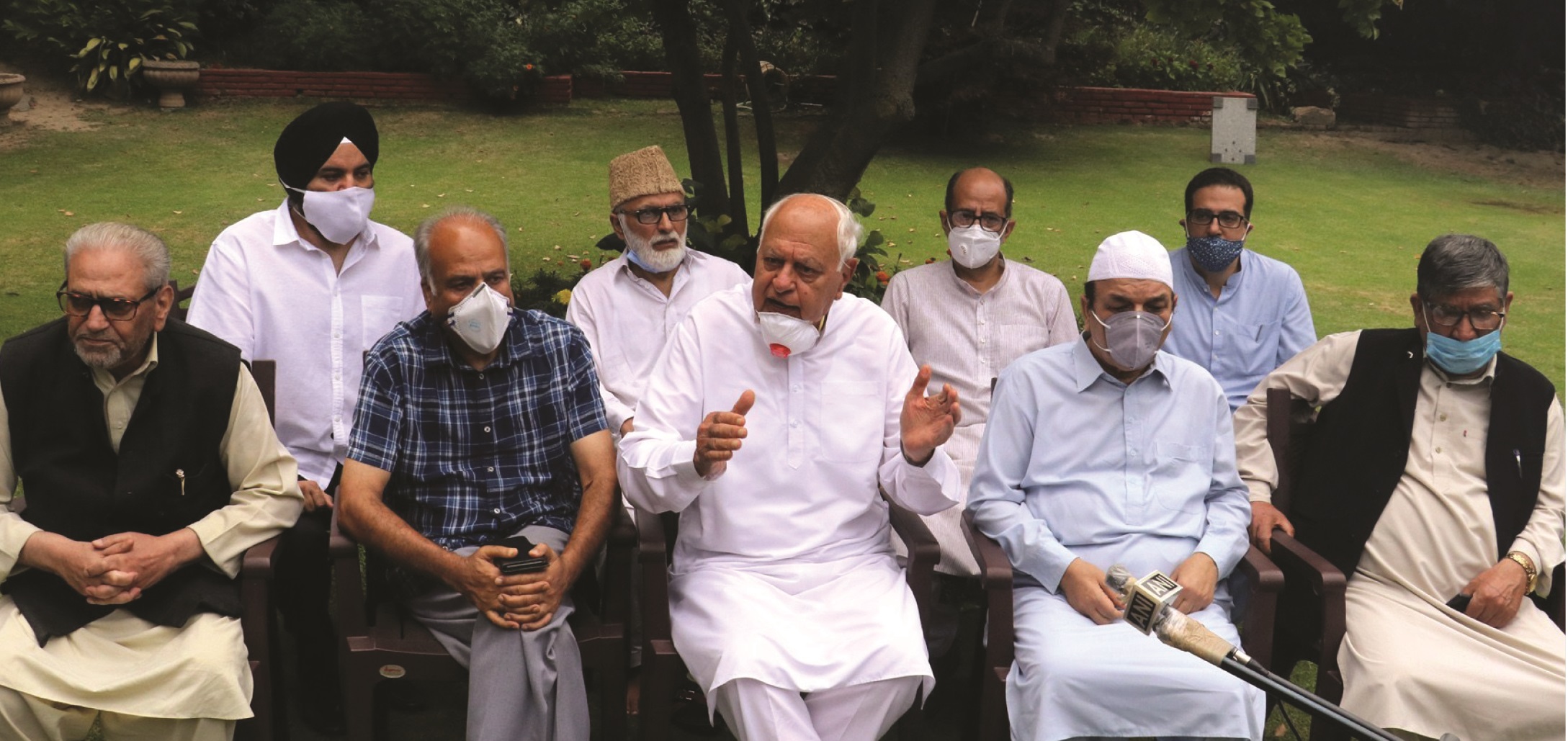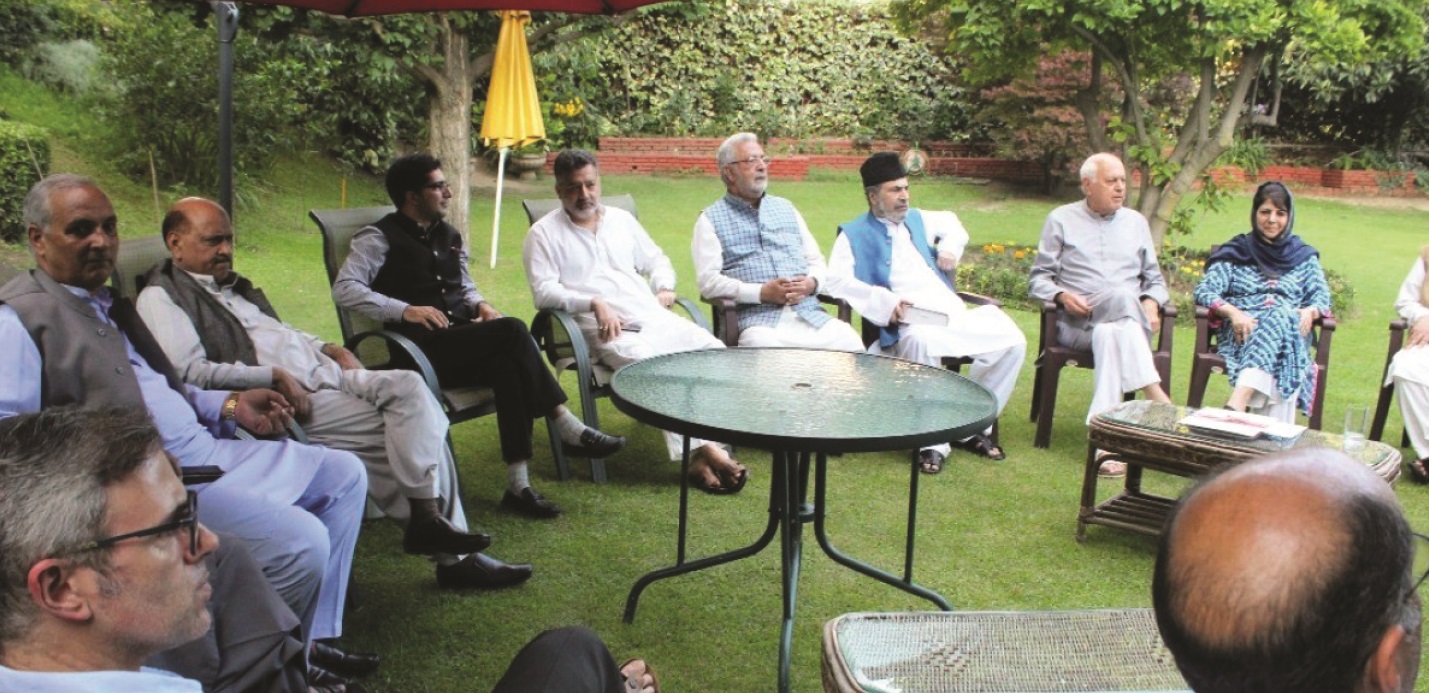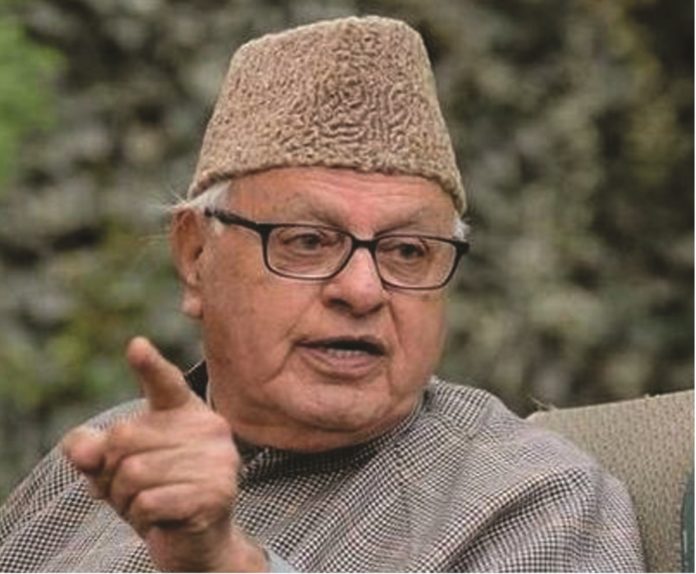The erstwhile “Lion of Kashmir” Shaikh Abdullah dynasty is not well reputed amongst the Kashmiri people. As long as Chief Minster ship of Indian Illegally Occupied Jammu and Kashmir (IIOJ&K) is within the family, they lick the boots of whosoever rules New Delhi. The moment the mantle passes on to someone outside their family, they start talking about greater autonomy. Whatever Jammu and Kashmir is today and whatever it is not, credit or discredit largely goes to the Abdullah’s.
With the post-August 05 2019 political order, Sheikhs are likely to become irrelevant. Now as the political fate of dynasty the hangs in balance, Sheikhs are jockeying between options. While elderly Farooq Abdullah wants restoration of pre-August 05 2019 status quo ante, the young Omar Abdullah is tweeting around that he won’t ask Prime Minister Narendra Modi to restore Articles 370 and 35A of the Indian constitution. See how shamelessly this dynasty wants to keep all options leading to CM House open.
With this back ground Farooq Abdullah gathered the pro-India Kashmiri politicians at his Gupkar Road residence in Srinagar to make public their future course of action. The Gupkar Declaration II was announced on August 22, it is a follow-up to the pre-annexation Gupkar Declaration I of August 04, 2019.
Farooq Abdullah had presided over the meeting of the pro-India political parties leading to Gupkar I on August 04, 2019. The meeting was attended by the representatives of the Jammu and Kashmir National Conference; Jammu and Kashmir Peoples Democratic Party; Jammu and Kashmir People’s Conference; Jammu and Kashmir Pradesh Congress Committee; Communist Party of India (Marxist); Peoples United Front and Awami National Conference. All these parties are focused on autonomy of Indian-annexed Kashmir within the ambit of the Indian Constitution.
Participants had deliberated on the then prevailing political situation triggered by massive deployment of security forces, the multitude advisories issued, the abandonment of Amarnath Yatra midway, and the forced removal of tourists from the Valley.
It was unanimously resolved: “That all the parties would be united in their resolve to protect and defend the identity, autonomy and special status of J&K against all attacks and onslaughts whatsoever; That modification, abrogation of Articles 35A, 370, unconstitutional delimitation or trifurcation of the State would be an aggression against the people of Jammu, Kashmir and Ladakh; That the parties participating in the meeting resolved to seek audience with the President and Prime Minister of India and the leaders of other political parties to apprise them of the current situation and make an appeal to them to safeguard the legitimate interests of the people of the State with regard to the guarantees given to the State by the Constitution of our country”. They pondered over the unwholesome consequences bound to follow the unconstitutional violation of these guarantees and resolved to remain together and stand united in their struggle for safeguarding the identity, autonomy, and special status of the State. So far they have kept their word.
However, even before they could implement the decision of the Gupkar Declaration I, most of them were thrown in jails or were kept under preventive detention with the abrogation of Article 370& 35A. For a year, no political activity was seen in Jammu and Kashmir, except some membership drives by Bhartiya Janata Party (BJP) which acted as an invincible entity, because the Governor-run administration had imposed strict restrictions on any kind of political activity, despite the fact that India is supposed to be a democratic country. Many political leaders, including former Chief Minister and President Jammu and Kashmir Peoples Democratic Party (JKPDP) Mehbooba Mufti are still under detention, while some have been released after signing a bond of compliance with the government.
Now on 22nd August, 2020, a new resolution termed Gupkar Declaration-II was circulated in the media. This was the first combined statement issued by the political parties after more than a year. Acknowledging the difficulties in bringing out a resolution of all political parties, it stated that the signatories to the Gupkar Declaration-I “have barely managed to establish basic-level communication with each other” in the face of a series of prohibitive and punitive curbs imposed by the Indian government, aimed at impeding all social and political interactions.
According to a senor Indian journalist Chanchal Manohar Singh, “After almost a year, the resolve of all major political parties in Jammu and Kashmir to reiterate the demand of the implementation of the Gupkar Declaration of August 04, 2019, has finally reflected the signs of dissent against the “unconstitutional” and “unilateral” abrogation of Articles 370 and 35 A. And “Gupkar Declarations proves Kashmir is experimental lab for politicians”
The leadership stated during the Gupkar Declaration II: “Let (PDP chief) Mehbooba ji be released, all of us will sit together and decide our way ahead, but let me assure you that our struggle will be peaceful. We don’t believe in stones and bullets. There is no room for stones and bullets. It will be a Gandhian way of struggle.”
The Gupkar Declaration II enlists three points (demands) in only 122 words: “That all the parties would be united in their resolve to protect and defend the identity, autonomy, and special status of J&K against all attacks and onslaughts whatsoever. That modification, abrogation of Articles 35A, 370, unconstitutional delimitation or trifurcation of the State would be an aggression against the people of Jammu, Kashmir and Ladakh; That the parties participating in the meeting resolved to seek audience with the president and prime minister of India and the leaders of other political parties to apprise them of the current situation and make an appeal to them to safeguard the legitimate interests of the people of the State with regard to the guarantees given to the State by the Constitution of our country”. By and large Gupkar II is reiteration of Gupkar I.

We Don’t Bullets In Bullets And Ston Throwing Politics
The Gupkar Declaration II has declared its ideology of peace by mentioning that “We don’t believe in bullets and bullet and stone throwing politics”. They abjured violence of all forms, including pelting stones at the security forces. This is very significant as the Gupkar Declaration has separated itself from those fighting with arms. Therefore, the Indian puppet political parties of IIOJ&K again send a loud message that they do not subscribe to struggle for the right of self-determination, and they feel comfortable while the IIOJK remaining part of India.
Though, political parties in Jammu and Kashmir, especially the National Conference and Peoples Democratic Party are up in arms against BJP, the fact of the matter is that these two parties have always supported BJP to spread its roots in Jammu and Kashmir. Not only did Mufti Muhammad Sayeed become Chief Minister with the support of BJP in J&K, after his death his daughter Mehbooba Mufti also became Chief Minister. Now, if these parties think that BJP would surrender before them to reverse its annexation action, it would be a naïve idea. And BJP knows that abrogation of article 370 has garnered huge support to the right-wing political outfits outside J&K. Although J&K pro-India parties have set apart their ideological differences to launch a struggle against abrogation of Article 370, still it does not show an encouraging future. The J&K administration proposes to go ahead with the delimitation of the assembly and parliamentary seats. The election commission has already announced the formation of the Delimitation Commission, which would start its exercise in the near future.
The Gupkar Declaration II says, “The series of measures undertaken on 5th August 2019 were grossly unconstitutional.” But the Gupkar Declaration fails to mention that these measures also contravene the UN Security Council resolutions 122 and126 adopted on January 24, 1957, and December 2, 1957, respectively. These resolutions prohibit any unilateral action targeted at changing the disputed nature of the State of Jammu and Kashmir. It is important to mention here that the United Nations Security Council Resolution 122 “reaffirms the affirmation of its resolution 91 (1951) and declares that the convening of a constituent assembly as recommended by the General Council of the ‘All Jammu and Kashmir National Conference’ and any action that assembly may have taken or might attempt to take to determine the future shape and affiliation of the entire State or any part thereof, or any action by the parties concerned in support of any such action by the assembly, would not constitute a disposition of the State in accordance with the above principle.”
Pakistan Foreign Minister Shah Mahmood Qureshi has stated that the second declaration was “not an ordinary occurrence but an important development”. Reacting sharply to Pakistan hailing the Declaration II Farooq Abdullah asserted that “we are not anyone’s puppets”. “Pakistan has always abused mainstream political parties of Jammu and Kashmir but now suddenly they like us”, He added: “Let me make it clear that we are not anyone’s puppets, neither New Delhi’s nor of anyone across the border. We are answerable to the people of Jammu and Kashmir and will work for them.” In response to a question by Press Trust of India on cross-border terrorism, Abdullah said, “I would urge Pakistan to stop sending armed men into Kashmir. So the Sheikhs know well where their bread resides and which side of that bread is buttered.
Much against the expectation of the Union government, the situation in J&K has deteriorated further and now Kashmir has three different kinds of dissenting voices: those believing in violence and on the path to wage war against India to set Kashmir free, those believing in peaceful means and contributing to strengthening Indian democracy in Jammu and Kashmir since last many decades and those who want to assimilate Kashmir into Pakistan by triggering anti-India and anti-government protests.

There is hardly any response to the Gupkar group by the Prime Minister Narendra Modi or his Minister of Home Affairs Amit Shah, who holds the reins of two Union Territories-J&K and Ladakh. Farooq Abdullah blamed the Prime Minister for creation of a new chapter of peoples’ alienation in J&K. According to Farooq, every decision is taken at PM level.
The only response to the Gupkar Declaration came from the J&K BJP president Ravinder Raina who launched a scathing attack on sponsoring political parties, especially the National Conference and the Congress for enacting the instrument of Gupkar Declaration to demand the reversal of the abrogation of Article 370. Rana charged that “those who want to fight the nullification of Article 370 and demand for the restoration of special status to the erstwhile state are supporters of Pakistan”.




